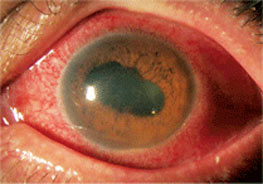
Uveitis is an internal inflammation of the eye. The condition involves the middle layers of the eye, also called the uveal tract or uvea. The uvea includes the iris, choroid (a thin membrane containing many blood vessels) and the ciliary body (the part of the eye that joins these together).
Symptoms may include:
- Eye redness and irritation
- Blurred vision
- Eye pain
- Increased sensitivity to light
- Floating spots before the eyes
Inflammation is the body's natural response to tissue damage, germs, or toxins. It produces swelling, redness, heat and destroys tissues as certain white blood cells rush to the affected part of the body to contain or eliminate the insult.
Uveitis may be caused by:
- An attack from the body's own immune system
- Infections or tumors occurring within the eye or in other parts of the body
- Bruises to the eye
- Toxins that may penetrate the eye